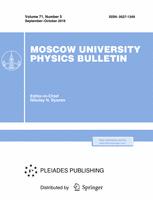Annotation
We study the relationship between the error in the discrimination of two possible evolution paths of a quantum system and its initial state. We consider the case of two-level discrimination when there are no fluctuations of nonquantum nature (the system is in a pure state). It is shown that two evolution paths can be distinguished only when the indeterminacy in the difference of quantum phases ($\sigma _{\phi}$) in the possible evolution paths is greater than unity; the discrimination error is then independent of the average value of the phase difference.
© 2016 Publisher M.V.Lomonosov Moscow State University
Authors
Yu.I. Vorontsov, F.Ya. Khalili
Department of Physics of Oscillations, Faculty of Physics, Moscow State University, Leninskie Gory, Moscow, 119992, Russia
Department of Physics of Oscillations, Faculty of Physics, Moscow State University, Leninskie Gory, Moscow, 119992, Russia



